News
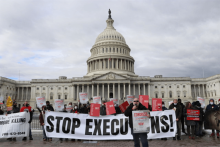
The Abolitionist Action Committee was marking the 45th anniversary of the first execution in the modern era: Gary Gilmore was executed by firing squad on Jan. 17, 1977; he had been convicted of murdering two men in Utah in 1976, and the Supreme Court ruled the death penalty legal that same year.

Pope Francis on Monday condemned “baseless” ideological misinformation about COVID-19 vaccines, backing national immunization campaigns and calling health care a moral obligation.
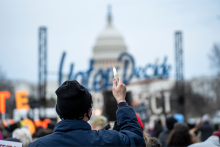
A year after the Jan. 6, 2021 attack on the U.S. Capitol, the District of Columbia remained largely silent. President Joe Biden gave a speech condemning the attack, Democratic members of Congress led remembrances, and different groups held vigils near the Capitol; a small group held a vigil in protest to the incarceration of those who participated in the Jan. 6 attack.
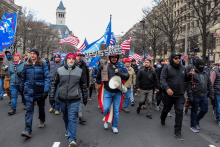
Last January, over two dozen community members assembled near the large Martin Luther statue outside Luther Place Memorial Church in downtown Washington, D.C., for a morning of orchestrated silent prayer. Staggered six-feet apart in the sharp winter air, they were acutely aware that the Capitol was already abuzz with protesters waving Trump flags, holding signs invoking Jesus Christ, and outfitted in insignia from dangerous far-right organizations.
This year, to mark the one-year anniversary of Jan. 6, the church plans to hold a prayer service in reflection of the insurrection that took place less than two miles from their congregation at the U.S. Capitol building.
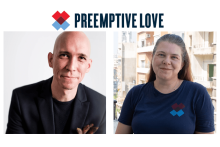
Preemptive Love Coalition’s board of directors announced on Jan. 4 that the organization’s founders, Jeremy and Jessica Courtney, would not be returning to the organization in any capacity, after an investigation into the Courtneys’ leadership.
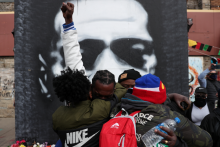
A collection of photos that defined 2021.
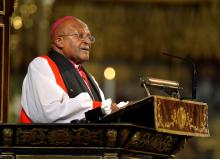
Desmond Mpilo Tutu, the Nobel Peace laureate whose moral might permeated South African society during apartheid's darkest hours and into the uncharted territory of new democracy, died on Sunday. He was 90.
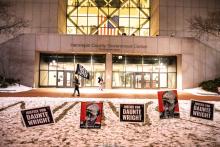
A 12-member jury found Potter, 49, guilty of first degree and second degree manslaughter in the death of the 20-year-old Wright.

On Dec. 14, siblings Bekah, Caleb, and Joshua Liechty, collectively known as Girl Named Tom, became the first group to win NBC’s The Voice after 20 seasons of solo winners. In a blind audition, the siblings delighted the four celebrity coaches with their tight harmonies, but each of the three got a chance to shine throughout their performances. With the enthusiastic support of their coach, Kelly Clarkson, the trio presented new arrangements of beloved classic rock, country, and folk hits.
The Liechty siblings grew up attending Zion Mennonite Church in Archbold, Ohio, and brothers Caleb and Joshua are graduates of Goshen College, a Mennonite college. While Bekah and Joshua, who spoke with Sojourners, consider their faith identity to be “in exploration,” they continue to be rooted in Mennonite community.
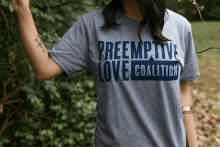
Former employees at Preemptive Love Coalition, an international relief organization, have alleged that its leaders created an abusive environment. On Dec. 15, Ben Irwin, the organization’s former director of communications and public relations, wrote on Twitter and in subsequent posts to Medium, that Preemptive Love’s founders, Jeremy and Jessica Courtney, “abused, gaslit, threatened, and mistreated dozens of staff over the years.”
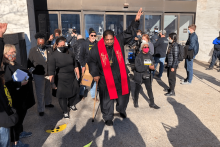
Revs. William Barber II and Liz Theoharis, co-chairs of the Poor People’s Campaign, held a press conference and protest in the front of the Hart Senate Office Building in Washington, D.C., on Dec. 14 to pressure Sen. Joe Manchin (D-W.Va.) to meet with and hear the concerns and demands from the West Virginian delegates and other members of the campaign.
The pair read from a letter citing the parable of the sheep and the goats in Matthew 25:31-46, calling on Manchin to pledge full support for the Build Back Better plan and the John Lewis Voting Rights Act.

Last September, the Catholic Labor Network, a nonprofit dedicated to workers’ rights, trained six priests to perform “card checks” for workers looking to unionize. Since then, the priests have performed card checks for six local union efforts through UNITE HERE, a labor union that represents over 300,000 U.S. and Canadian workers in the hotel, food service, transportation, and other industries.
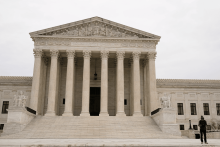
Conservative Supreme Court justices on Wednesday appeared ready to further expand public funding of religiously based entities, indicating sympathy toward a challenge by two Christian families to a Maine tuition assistance program that excludes private schools that promote religious beliefs.
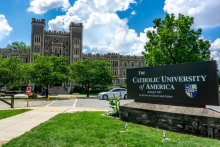
In the wake of controversy surrounding an icon at the Catholic University of America’s Columbus Law School, the school’s undergraduate student government passed a resolution Monday requesting university officials replace the painting with art that is “non-political and uncontroversial.”
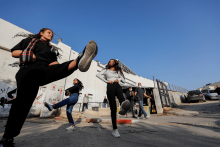
A giant Christmas tree takes pride of place in Bethlehem’s Manger Square, between the Church of the Nativity and a mosque adorned with lights cascading down its walls.
But there is more to the Palestinian city than its biblical significance, say organisers of the Bethlehem Cultural Festival, which promotes other aspects of the place revered as the traditional birthplace of Jesus.
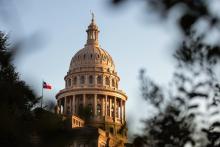
The U.S. Department of Justice is throwing its weight into the legal fight over Texas’ newly drawn maps for Congress and the state House.
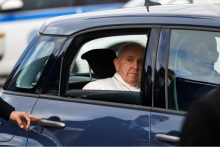
Pope Francis said on Monday he was willing to go to Moscow to meet Russian Orthodox Patriarch Kirill “brother to brother” in what would be the first trip by a pope to Russia.
The icon is on display in two locations — the Catholic University of America’s Columbus Law School in Washington, D.C., and at The Episcopal Church of the Holy Communion near St. Louis. In November, The Daily Signal, a conservative news outlet, published a story about the CUA edition of the painting. Since then Kelly Latimore has been receiving death threats.

A Roman Catholic priest is collecting and saving hundreds of traditional pre-Christian religious artifacts in southeast Nigeria that new converts to Christianity had planned to burn.
The collection includes carvings of pagan deities and masks, some of them more than a century old and considered central to the pre-Christian religion of the Igbo people, who traditionally believed them to be sacred and to have supernatural powers.

Pope Francis said on Monday that migrants were being exploited as “pawns” on a political chessboard in an apparent reference to the crisis at the Belarus border.
Thousands of migrants are stuck on the European Union’s eastern frontier in what the EU says is a crisis Minsk (Belarus’ capital city) engineered by distributing Belarusian visas in the Middle East, flying them in and letting them go to the border.